Listen below to the audio of the Candlelight Vigil for Haiti Earthquake Victims, organized by Pierre Labossiere, Congresswoman Barbara Lee and Supervisor Keith Carson and recorded by Kamau Amen-Ra and watch a video produced by Minister of Information JR
by Minister of Information JR
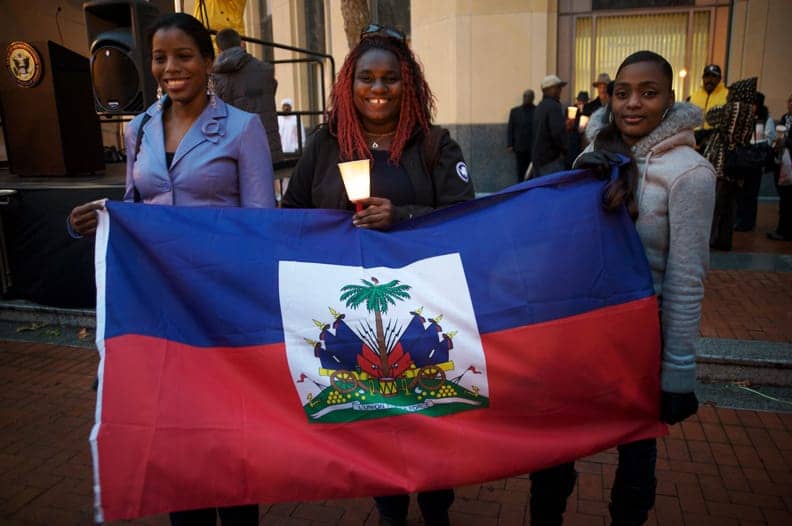
We wanted to talk to him because he has contacts in Haiti who could inform us as to what is happening on the ground. That way we could have an independent information line so we don’t have to depend on CNN or Democracy Now to tell us who we should support, as well as what of importance is happening to the descendants of the founders of the world’s first Black republic, who militarily defeated their colonizer, France, led by Napoleon Bonaparte.
“My decision to destroy the authority of the Blacks in Saint Dominque (Haiti) is not so much based on considerations of commerce and money as on the need to block forever the march of Blacks in the world,” Napoleon explained.
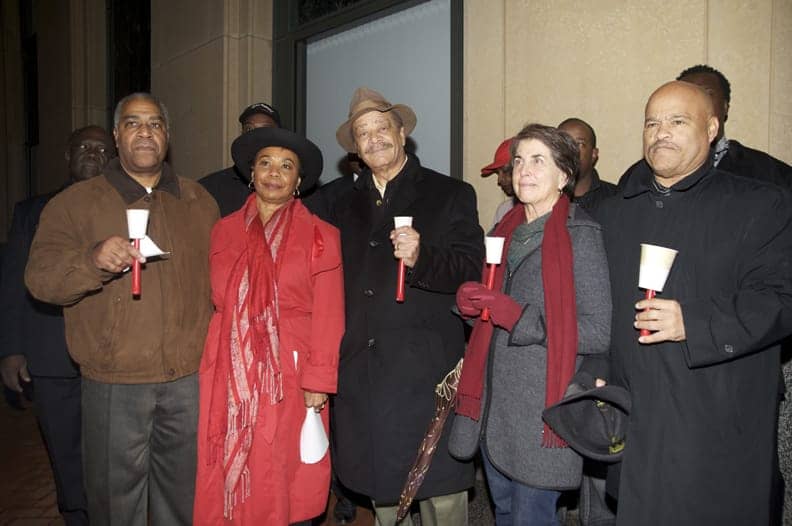
Here is Pierre Labossiere with an update …
M.O.I. JR: Can you tell the people a little bit about what happened? Everyone by now should have seen it on television. Can you give a brief synopsis about this earthquake in Haiti and how it has affected the people and infrastructure of Haiti?
Pierre Labossiere: Just a week ago, on Jan. 12, Haiti was hit by a 7.0 magnitude earthquake, and it really devastated the capital city of Port au Prince and also many other cities have suffered major damage. Many lives are lost, the cathedral has crumbled, the national palace has crumbled, many of the government buildings have crumbled – and houses.
It was, from the photos I’ve seen, just devastating. It lasted 35 seconds, and to this day the number of dead and injured cannot be calculated. There are estimates ranging from 100,000 people; I’ve heard an estimate probably as high as 200,000 people. No one knows.
People may have seen the horrific footage of the injuries and how bodies are being picked up to be loaded to be buried, really. And many people do not know what has happened to their loved ones. People are still searching for folks.
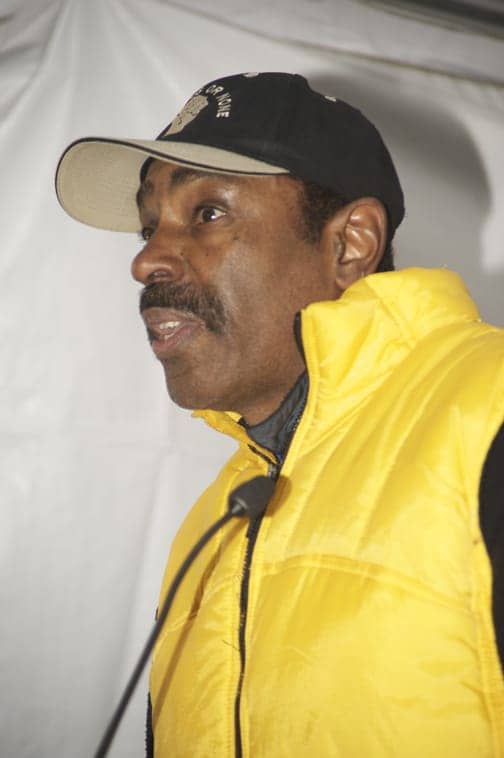
M.O.I. JR: You speak about Port au Prince, but are other areas of Haiti affected?
Pierre Labossiere: Yes. There are a number of cities – and that is what I am hearing from the brothas and sistas on the ground – cities like, in the south, Les Cayes, Jacmel … there are a number of cities, but news of this is trickling out. We are not seeing much, and that’s why many people are infuriated by this because Haiti is under occupation by the U.N., so France, Canada and the U.S., using the U.N. as a proxy, have complete control over Haiti.
And these guys have all kinds of equipment. They have helicopters, you know? They are running the country, and yet and still we are hearing today that (people in Haiti) haven’t seen anyone who has mentioned what has happened to them. You know there are some very disturbing stories that have been coming out in the media, where communities that have been deeply affected are not seeing any kind of response.
Haiti is under occupation by the U.N., so France, Canada and the U.S., using the U.N. as a proxy, have complete control over Haiti.
Haiti is not that big. Haiti is the size of the state of Maryland. And with helicopters flying all over the place, yet nobody right there even in Port au Prince – people are not being told. Of course, various communities are not being approached. They are not seeing anybody come by to check and assess the damage or their needs.
People are thirsty. People are hungry. And it’s incredible what’s going on, and that’s criminal.
M.O.I. JR: You just said that Haiti is under United Nations occupation, and recently the president of Haiti, Preval, who was basically imposed on Haiti after the coup d’etat that took out the democratically elected president, Aristide, he signed over basically Haiti’s sovereignty, most importantly the airport at this point. There are a number of supplies at the airport from various countries, including Cuba, Venezuela and Bolivia, as well as others. Can you speak to how and why this happened?
Pierre Labossiere: The prime minister who was imposed on Haiti was Gerard Latortue. The U.S., France and Canada participated in the kidnapping of democratically elected President Aristide in 2004, the year of our bicentennial, on Feb. 29, 2004.
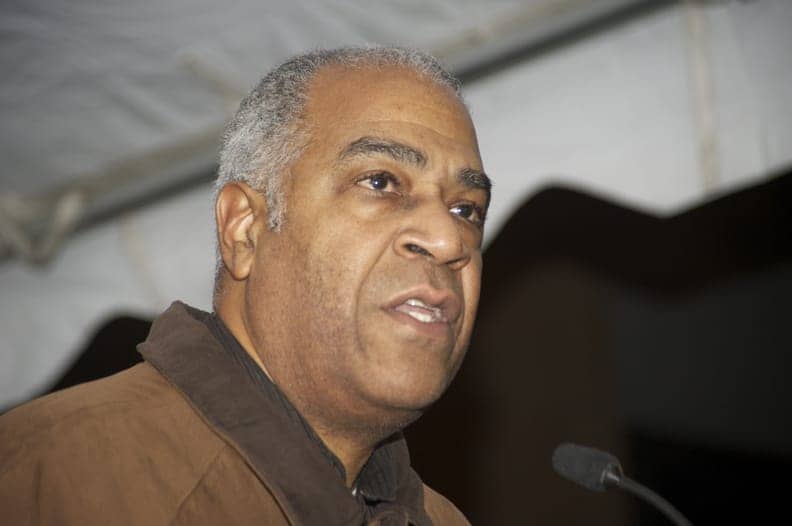
And what we have been seeing is the situation with living conditions has not improved for the Haitian people. As a matter of fact, living conditions have gotten much worse since the coup against President Aristide.
Progress made under President Aristide destroyed since coup
During President Aristide’s time, there were only 3,500 policemen and women in Haiti, and 3,000 of them had arms and 500 didn’t have any, just a baton. But we didn’t have the level of crime and insecurity as was occurring up to the earthquake under the U.N. watch.
For example, when President Aristide was there – despite the fact that there was economic sabotage, an economic boycott of resources, of loans that were supposed to come to Haiti to help out, and they sabotaged the economy, as a way to topple President Aristide – still he built schools. He built a medical school, hospitals, clinics and he also financed subsidized schools for children. He financed a literacy program, Alfa Resto, where people could buy a meal at a low price while you are learning how to read and write.
So it was a program, and there were other programs that were designed to help the economy progress, to strengthen or invest in our agricultural production. And the motto of the Lavalas Party, the party of President Aristide, was to invest in human beings. “Investing in humans” was the title of the program.
Aristide empowered Haitians economically
It included increasing the minimum wage. President Aristide doubled the minimum wage at that time as well. So that angered the forces here in the U.S. who don’t want to see that. They want to see Haiti being a place of low wages – I mean no wages at all when you look at what it costs to live there. That is what they want.
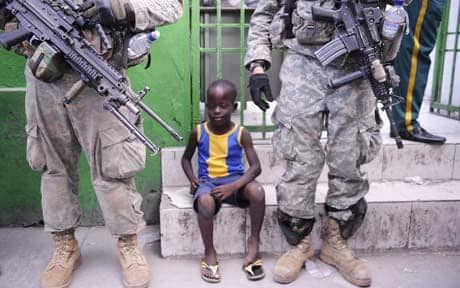
There is an economic aspect as well. It creates an unemployed desperate labor pull, so for each and every job, you have a hundred people ready to fight over it. Then it is easier to lower the wages for everybody.
And it affects us here too, because in a situation like this, companies find it profitable to come and shut their plants down in the U.S. and other places and come and move to Haiti, where they could pay cheaper wages. And they use that as leverage against brothas and sistas in other countries who are standing up asking for higher wages and better living conditions, because they threaten you with moving to Haiti.
So during collective bargaining, they could use that as a bargaining chip really to their advantage. So those are the things and those are the reasons why they did what they did, by kidnapping President Aristide and having the coup and removing him from Haiti. So that is what the result of this has been.
Haiti had disaster response system under President Aristide
Natural disasters happen. Nobody has control over that. However, the infrastructure of the country, of the community, allows you to provide services for your people. It allows for the people to rebound after such a crisis. It provides you with a government structure with people able and ready to help and assist, to rescue people and save the survivors and provide sustenance for the survivors.

But during the coup – a coup financed and participated in by the forces of the U.S., France, and Canada – those buildings were destroyed. The trained staff was kicked out of Haiti, rounded up, and many of them jailed. Many were killed. Many were forced out of the country.
(It was) complete destruction. Nothing was put in its place, you see, so you have a terrible lack of infrastructure. We looked at this situation before. After the coup in 2004, there was a hurricane that devastated the city of Gonaives. No response.
The same thing in 2008: We had four major hurricanes and no response. And then this earthquake. Again it exposes the failure of this occupation of Haiti by the U.N., which by the way has all of the resources at its disposal.
Email POCC Minister of Information JR, Bay View associate editor, at blockreportradio@gmail.com and visit www.blockreportradio.com.
Haiti Relief Benefit
Out of the despair we feel for our sisters and brothers in Haiti and our fury at the criminal neglect of their needs by the U.S. and U.N. come plans for making a way out of no way. Bay View associate editor Minister of Information JR and his friend, a young doctor who worked with him years ago in political organizing, are pulling together a media-medical team to travel to Haiti to work in solidarity with the people, ministering to their medical needs and reporting the truth to the outside world.
Come to the Haiti Relief Benefit for the media-medical team on Sunday, Jan. 24, 7 p.m., at the Black Dot Café, 1195 Pine St. in West Oakland. Hear an update on Haiti from Pierre Labossiere, beloved and respected throughout the U.S. and Haiti, who is guiding the Bay View and Block Report Radio as we prepare to send the media-medical team to Haiti, and attorney Walter Riley, who was in Haiti and gave first aid to the people when the earthquake struck and who heads the Haiti Emergency Relief Fund. Along with your checkbook, please bring medical supplies of any and all kinds.
If you can’t attend the benefit, you may make your tax-deductible donation to the Haiti media-medical team at Support SF BayView (at the top of the left-hand column at www.sfbayview.com) by scrolling down to MAKE A TAX-DEDUCTIBLE DONATION. Or mail your check, made out to HRIN, to SF Bay View, 4917 Third St., San Francisco CA 94124. The Bay View’s 501(c)(3) nonprofit project, the Hurricane Relief Information Network (HRIN), was created for survivors of Katrina and subsequent disasters.
For all other earthquake relief for Haiti, the Bay View strongly urges your support for the Haiti Emergency Relief Fund, founded by Harry Belafonte, Danny Glover and Walter Riley and closely affiliated with the Haiti Action Committee, co-founded by Pierre Labossiere. To donate, go to HaitiAction.net or make your check out to Haiti Emergency Relief Fund/EBSC – donations are tax deductible – and mail it to East Bay Sanctuary Covenant, 2362 Bancroft Way, Berkeley CA 94704.
Candlelight Vigil for Haiti Earthquake Victims
Held on Martin Luther King Day, Monday, Jan. 18, 5 p.m., at the Oakland Federal Building, 1301 Clay St., and organized by the Haiti Action Committee, Congresswoman Barbara Lee and Supervisor Keith Carson, the speakers are Pierre Labossiere, Rev. J. Alfred Smith Jr., Attorney Walter Riley, Congresswoman Barbara Lee, Supervisor Keith Carson, Sister Maureen Duignan and Rev. Phil Lawson. The recording is by Kamau Amen-Ra and the video by Minister of Information JR.
Candlelight Vigil for Haiti Earthquake Victims
Oakland Responds to Haiti from New America Media on Vimeo.
Oakland responds to Haiti’s January 12 earthquakeWe talk to Walter Riley, a survivor of the Jan 12 earthquake in Haiti, as people support the Haiti Action Committee in Oakland, CA.
www.NewAmericaMedia.org
www.YouthOutlook.org





